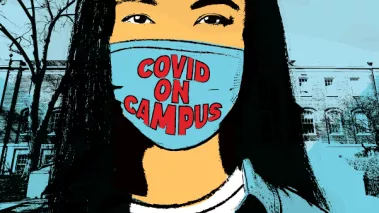Table of Contents
Zoom and gloom: Campus dissent silenced amidst pandemic

PHILADELPHIA, Feb. 16, 2021 — As the pandemic cleared out campuses and quieted once-bustling classrooms, experts at the Foundation for Individual Rights in Education expected censorship to take a backseat to the health crisis. But as cases of COVID-19 took off, so too did case submissions from students and faculty nationwide alleging rights violations.
A new report from FIRE shows how censorship spread during the pandemic, and how the tools higher education used to keep students informed, such as Zoom, aided in silencing dissenting voices.
“One clear lesson from the pandemic is that censorship can have a serious negative impact on public health,” said FIRE Director of Targeted Advocacy Sarah McLaughlin, author of COVID on Campus: The Pandemic’s Impact on Student and Faculty Speech Rights. “COVID-19 requires extensive and, in some cases, unprecedented measures to protect public health. Censorship isn’t one of them.”
Colleges abused their authority in three principal ways:
- Issuing unconstitutional gag orders to silence criticism of institutions, including forbidding resident assistants from speaking openly about their safety concerns when they felt institutional policies put their health at risk.
- Censoring speech related directly to COVID-19, including forbidding faculty doctors fighting the pandemic from speaking to the media.
- Applying campus measures in the name of public health that threaten individual rights, including tracking attendees of private meetings, forcing students to agree to public health pledges, and blaming the pandemic for censorship of unrelated speech, including — puzzlingly — a virtual play about a gay Charlie Brown.
As submissions about rights violations skyrocketed, FIRE warned colleges that public health practices must be clear, published, and consistently enforced.
The report also examines how Zoom is complicit in silencing dissenting voices. Reports accuse the company of closing accounts at the behest of the Chinese government due to their viewpoint. As Americans debate the role of censorship and technology companies, the question remains: In a higher ed landscape dominated by virtual learning, what happens when it is Zoom Video Communications, Inc. that is picking and choosing “appropriate” viewpoints?
“COVID-19 forced education online — and introduced new challenges to free expression,” said McLaughlin. “When we outsource classrooms to internet services like Zoom, we must be prepared for the possibility that they may import censorship.”
The Foundation for Individual Rights in Education (FIRE) is a nonpartisan, nonprofit organization dedicated to defending and sustaining the individual rights of students and faculty members at America’s colleges and universities. These rights include freedom of speech, freedom of association, due process, legal equality, religious liberty, and sanctity of conscience — the essential qualities of liberty.
CONTACT:
Katie Kortepeter, Media Relations Associate, FIRE: 215-717-3473; media@thefire.org
Recent Articles
FIRE’s award-winning Newsdesk covers the free speech news you need to stay informed.

FIRE to SCOTUS: TikTok ban violates Americans' First Amendment rights

California and other states are rushing to regulate AI. This is what they’re missing

One day after FIRE lawsuit, Congress passes changes to filming permits in national parks
